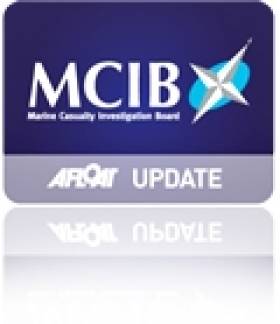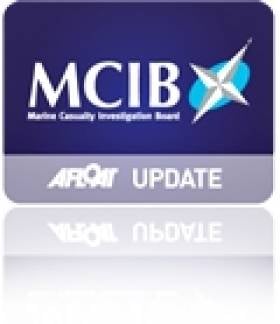Displaying items by tag: PFD
MCIB Issues Report On Castletownbere Drowning
#MCIB - A poorly positioned lobster pot hauler and failure to maintain a working PFD have been identified among the main contributing factors in the death of a retired schoolteacher and recreational fisherman off West Cork two years ago.
That's according to the Marine Casualty Investigation Board's (MCIB) report on the incident off the Beara Peninsula on 17 August 2012, in which 66-year-old Pearse Lyne drowned after his fishing boat capsized.
As previously reported on Afloat.ie, Lyne's death was the second tragedy to befall the Castletownbere area in mid August 2012, occurring just days after farmer and poet John O'Leary drowned off Cod's Head.
The MCIB report established that Lyne had set out to sea on the morning of 17 August 2012 in a hurry to retrieve his lobster pots as that year's fishing season closed out.
Though Met Éireann's reports on the day's weather conditions were favourable, anecdotal evidence from local mariners at the time suggest a heavy swell in the area.
Investigators also found that Lyne's unregistered boat, while in sound working order, had its lobster pot hauler fitted on the starboard stern quarter, not in the usual forward position, which may have made affected the boat's stability – although it is unclear exactly what caused the capsize.
In addition, Lyne was found not to be wearing a lifejacket or PFD when his body was removed from the water, though there is evidence he was attempting to access one from the forward locker when he was overcome by the situation.
But even if he had, the PFD found on board his vessel was determined to be defective, with its gas cartridge already expended.
The report recommends that a Marine Notice be issued recommending all mariners inspect their PFDs for defects such as expired or expended gas inflation cylinders.
The complete MCIB report can be downloaded as a PDF below.
Report into Death of Crab Fisherman Prompts Call for Review of Stability Standards
#MCIB - The Marine Casualty Investigation Board (MCIB) has recommended a ministerial review of stability standards for fishing vessels following its report into the death of a crab fisherman off Co Cork in January last year.
Gerry Hegarty drowned after a wave struck the crab boat Carraig An Iasc, which was fully loaded with crab pots at the time, causing it to capsize and sending its two-man crew into the water.
Hegarty, who was not wearing a personal flotation device (PFD) or other buoyancy aid, got into difficulty while attempting to swim ashore with his crewmate and skipper James Fitzgerald, who subsequently raised the alarm.
Lifeboats from Ballycotton and Crosshaven, as well as Irish Coast Guard helicopter Rescue 117, were tasked to the incident. Divers from Naval Service vessel LE Emer located the sunken crab boat but no body was found.
A coastguard search of the area continued over a number of days without success. Hegarty's body was eventually recovered on 17 February 2011 at Ringabella Strand in Co Cork.
The MCIB found it probable that the Carraig An Iasc encountered wind or wave action or a combination of both that caused the vessel to heel to an angle beyond which it was able to recover from its loaded condition. The vessel's Code of Practice Declaration of Compliance was valid until 15 July 2013.
The board noted that there have been "a number of incidents caused by overloading boats thus effecting stability", and recommended that the Minister for Transport reviews and revises the stability standards in the current Code of Practice to improve these standards.
It was also recommended that a safety notice be issued to all skippers and owners in the fishing fleet reminding them of their legal responsibility to ensure that all their crew wear PFDs or lifejackets while on deck.
The full report is available to download as a PDF from the MCIB website HERE.
- Crosshaven
- Cork
- Safety
- Fishing
- Ballycotton
- Lifejacket
- Lifeboat
- Marine Casualty Investigation Board
- Coastguard
- Irish Coast Guard
- Skipper
- naval service
- helicopter
- MCIB
- Rescue 117
- personal flotation device
- Minister for Transport
- LE Emer
- standards
- drowned
- crab fishing
- Carraig An Iasc
- Gerry Hegarty
- James Fitzgerald
- PFD
- Ringabella Strand
- Code of Practice
- stability
- overloading

























































